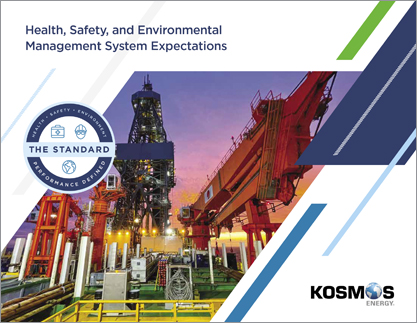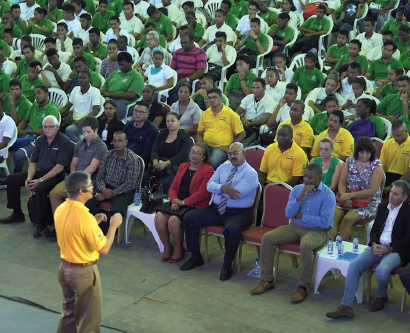Responsibility
Health and Safety
At Kosmos we are committed to the health and safety of our employees, local communities, and those that work with us. We strive to create an injury- and incident-free workplace.
Employees and contractors are expected to take action to ensure safe operations by following safe work practices, complying with relevant policies and regulations, and completing all applicable training.
Our One Team, One Goal initiative unifies our HSE policies, standards, systems and procedures. By working together as One Team -- all Kosmos employees and our contractors -- we can achieve our One Goal of delivering HSE excellence. Whether we work in an office or offshore, whether it's a matter of personal or process safety, and even at home, we all have a role to play.

To support our commitment to health and safety, the company has implemented a comprehensive management system that applies to all Kosmos employees and contractors. This management system establishes and communicates expectations in safety, risk management, emergency preparedness, and environmental protection. Specific goals and targets for each element are benchmarked and measured to track the company’s performance.
The Standard adheres to the Bureau of Safety and Environmental Enforcement (BSEE) Safety and Environmental Management Systems (SEMS) standards, which require our HSES management system and associated processes to be externally audited every three years. Our HSES Management System is also in line with International Association of Oil and Gas Producers (IOGP) guidelines.
In alignment with the Kosmos Energy business principles, we seek to ensure health, safety, environment and security (HSES) are a high priority during all phases of our operations. As such, we are committed to maintaining high standards that protect our employees, contractors and the communities where we operate.
We plan to accomplish this by having a positive impact, creating enduring value and practicing corporate social responsibility. Kosmos seeks to embody the principles of environmental stewardship with a goal of sustainable development.
At Kosmos, we are committed to:
- Assessing and minimizing risks that could lead to incidents or that could lead to adverse environmental or social impacts
- Reducing emissions and waste
- Being prepared to use energy and other natural resources efficiently
- Being prepared to effectively respond to emergencies
- Helping our employees, contractors, co-venturers, vendors and service providers understand how their actions influence HSES performance
- Working with stakeholders to understand the potential impacts of our activities
- Continuously improving our HSES performance through effective management systems
- These commitments are in addition to our basic expectation to comply with applicable health, safety, environmental and security laws and regulations
Performance
Kosmos reports safety data for our global operations, including both employees and contractors.
|
|
2022 |
2021 |
2020 |
|
Man Hours |
|||
|
Employee |
457,408 |
468,328 |
548,732 |
|
Contractor |
530,142 |
643,499 |
765,494 |
|
Total |
987,550 |
1,102,827 |
1,314,226 |
|
Fatalities |
|||
|
Employee |
0 |
0 |
0 |
|
Contractor |
0 |
1 |
0 |
|
Total |
0 |
1 |
0 |
|
Fatality Rate |
0 |
0.18 |
0 |
|
Lost Time Incident Rate (LTIR)1 |
|||
|
Employee |
0 |
0 |
0 |
|
Contractor |
0 |
0 |
0.76 |
|
Total |
0 |
0 |
0.76 |
|
Total Recordable Incident Rate (TRIR)1 |
|||
|
Employee |
0 |
0 |
0 |
|
Contractor |
0 |
0.18 |
0.76 |
|
Total |
0 |
0.18 |
0.76 |
|
HSE AND EMERGENCY RESPONSE TRAINING HOURS |
|||
|
Employee |
1,041 |
478 |
820 |
|
Contractor |
2,464 |
800 |
217 |
|
Total |
3,505 |
1,278 |
1037 |
|
Average Training Hours per Employee |
4 |
2 |
3 |
|
Average Training Hours per Contractor |
31 |
9 |
2 |
1. LTIR and TRIR metrics prior to 2021 were calculated using the IOGP method of incidents per 1,000,000 (1 million) work hours.
Lost Time Injury Frequency represents the number of lost time injuries (fatalities and lost work day cases) per million work hours. Total Recordable Injury Rate refers to recordable injuries (fatalities, lost work day cases, restricted work day cases, and medical treatment cases) per million hours worked.




